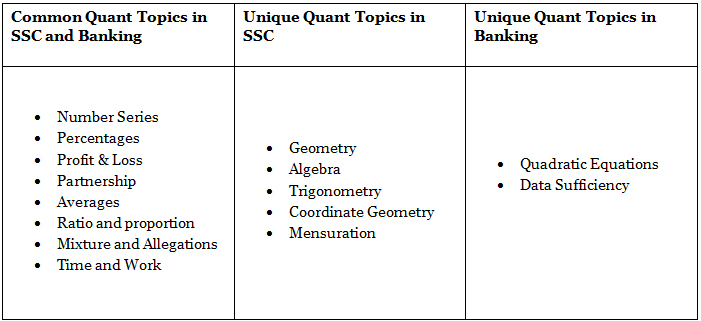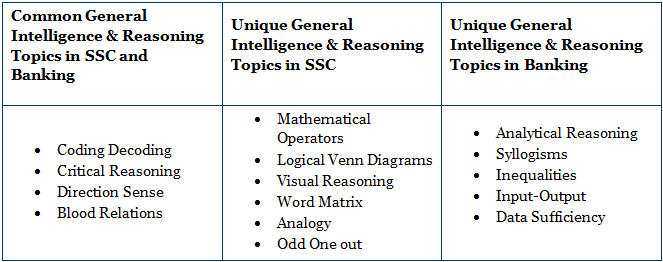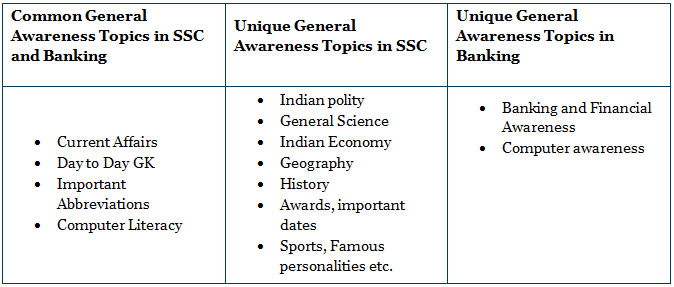SSC CGL vs Bank PO: Differences in Syllabus PDF Download
The government job sector in India offers a wide range of opportunities for job seekers, with the SSC and Banking exams being two of the most popular options. These exams attract lakhs of aspirants every year, each with the hope of securing a coveted government job. While the Banking exams are conducted by the Institute of Banking Personnel Selection (IBPS), State Bank of India, or Reserve Bank of India, the Staff Selection Commission (SSC) holds exams for various central government departments, including the Indian Audit & Accounts Department under C&AG, Central Secretariat Service, Ministry of External Affairs, and more.
For government job seekers, appearing for both the SSC and Banking exams is important, with many candidates applying for both. While there are similarities in the syllabus of these two exams, there are also significant differences that can be confusing for aspirants. In this article, we will provide a comparative analysis of the syllabus for SSC and Banking exams to clear any doubts and help aspiring candidates make informed decisions.
SSC Vs. Banking Syllabus: Quantitative Aptitude or Numerical Aptitude
The Quantitative Aptitude section holds great significance in both SSC and Banking exams. Aspiring candidates for both exams must focus on developing a strong foundation in this section to achieve good scores and clear the cutoffs. In recent years, many exams have introduced sectional cutoffs for all subjects, making it even more crucial for candidates not to underestimate the importance of the Quant section. With effective preparation, this section can be highly scoring. In this article, we will explore the common and unique topics covered in the Quantitative Aptitude section of the SSC and Banking syllabi.

Data Interpretation (DI) holds significant importance in banking exams, while its role is relatively smaller in SSC exams. In banking exams, DI questions are based on common topics such as Percentage, Profit & Loss, and Average. However, the key to success in the quantitative section of banking exams lies in practicing these topics in the form of DI.
SSC Vs. Banking Syllabus: English
The English section holds significance in both SSC and banking exams. However, there are notable differences in the focus of this section between the two exams. In SSC exams, English is more vocabulary-oriented, while banking exams prioritize comprehension skills. While a strong vocabulary is beneficial for candidates in both exams, banking aspirants particularly need to develop strong analytical skills in this section.

SSC Vs. Banking Syllabus: General Intelligence & Reasoning
Both SSC and banking exams include a significant number of questions from the reasoning section. However, there are notable differences in the syllabus of this section between the two exams. While there are only a few common topics, most of the typical topics are specific to banking exams. To gain a better understanding of the differences, refer to the following table:
The reasoning aptitude section in banking exams is often perceived as more challenging compared to SSC exams. Candidates need to dedicate thorough preparation to excel in the reasoning section of banking exams.
SSC Vs. Banking Syllabus: General Awareness
General awareness holds significant importance in all government exams, as it is crucial for achieving success in national-level competitive assessments. Both SSC and banking exams encompass a wide range of topics within the general knowledge section. However, notable distinctions can be observed in the specific topics covered in the general awareness sections of SSC and banking papers.

Banking general awareness predominantly focuses on banking awareness and financial awareness, although there are also some questions related to current affairs in several banking exams. On the other hand, SSC exams place less emphasis on computer literacy compared to banking exams, with a lower number of questions on this topic.
Frequently Asked Questions (FAQs): SSC CGL vs Bank PO: Differences in Syllabus
Is the Syllabus for SSC and Banking the Same?
While the syllabus of both Bank and SSC includes common subjects such as Quantitative Aptitude, Reasoning Ability, English, and General Awareness, there are differences in the topics covered.
Which is more difficult, SSC or Banking?
The Reasoning section in Bank exams is generally considered tougher than in SSC exams. Additionally, SSC exams do not have a section on computer aptitude. The General Awareness section in bank exams focuses on banking awareness and current affairs related to the economy and finance, whereas SSC exams cover broader current affairs.
Which is better, SSC CGL or Banking?
Promotions in banks follow a structured procedure, ensuring regular advancement for probationary officers. In SSC CGL, promotion opportunities depend on the specific department or sector.
Which is harder, SSC CGL or SBI PO?
SSC CGL has a lengthier process compared to SBI PO, making it more challenging. Additionally, in SBI PO, the marks of the preliminary exam are not considered for the final merit list, while the list is based on performance in the mains and interview.
Can we prepare for both banking and SSC exams together?
Since bank exams and SSC exams are often conducted simultaneously, candidates can prepare for both exams simultaneously. With dedication, hard work, and determination, it is possible to crack both exams.




















